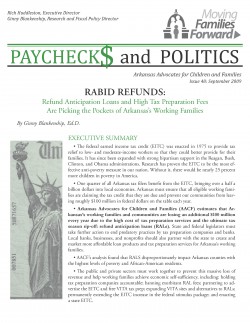
Arkansas working families are losing as much as $110 million every year because they don’t claim the federal Earned Income Tax Credit (EITC), a significant loss in federal dollars to the hard-pressed Arkansas economy. They spend another $100 million on expensive, and unnecessary, tax preparation services and refund anticipation loans, according to a new report from Arkansas Advocates for Children and Families.
“In these difficult economic times, we need to make sure that every eligible Arkansas working family gets the full benefit of the federal Earned Income Tax Credit,” said Rich Huddleston, executive director of Arkansas Advocates for Children and Families. “The IRS free tax preparation sites, or Volunteer Income Tax Assistance (VITA) sites, and other volunteer tax services, can help families claim the EITC. These sites also won’t offer high-priced refund loans or charge the stiff preparation fees that too many private tax firms charge.”
Based on IRS estimates that one in four eligible tax payers don’t claim the EITC, the new report calculates that Arkansas working families are losing between $88.5 and $110 million every year in unclaimed federal EITC benefits. That has a ripple effect on all Arkansans, weakening local economies, since most EITC recipients spend their credits in their local communities, according to the report – “Rabid Refunds: Refund Anticipation Loans and High Tax Preparation Fees are Picking the Pockets of Arkansas’s Working Families.”
The report provides county-by-county data on the number of tax payers that claimed the EITC and the amount of federal refund dollars that those claims brought into their local economies. It identifies 10 counties that have the lowest percentage of low-income tax filers claiming the credit and thus the greatest potential for increasing the number of eligible working families that claim the EITC. Ranked by percentage of claimants, those counties are Baxter, Benton, Cleburne, Saline, Marion, Washington, Faulkner, Grant, Boone and Garland. “We need to expand the number of VITA sites in Arkansas, and these 10 counties would be good places to start,” suggested Huddleston.
Even when Arkansans do claim the EITC, too often they lose much of its value to high tax preparation fees and very high interest loans using the refunds as collateral, the report found. For-profit tax preparation services take a big chunk of low-income family EITCs or other hard-earned dollars. On average these firms cost taxpayers $163 per filing. Refund Anticipation Loans, or RALS — short-term loans secured by a taxpayer’s expected tax refund — often charge interest rates in the triple digits, resulting in loans that cost on average $100 to put cash in the hands of the taxpayer only a few days earlier than the IRS would process their refunds. Nearly half of low income tax filers who used for-profit tax preparation services were sold RALs, and three out of four EITC filers who used for-profit tax preparation services were sold RALs.
The report estimates that all Arkansas low-income tax filers (not just those claiming the EITC), spent an estimated $21,688,000 in RAL fees and $77,954,098 in tax prepara¬tion fees in 2006, for a total of $99,642,098.
The report also notes that low-income African-American communities are hit hardest by the RAL fees. Of the top 10 counties with the highest percentage of tax filers using RALs in 2006, all but one are located in the Delta, and all have far higher levels of poverty and African-American residents than the rest of the state. Four out of five tax filers in counties with the highest number of African-Americans take out RALS, compared to a state average of just over one out of five. Huddleston pointed out that these counties—Phillips, Crittenden, Saint Francis, Mississippi, Lafayette, Hempsted, Desha, Lee, Chicot and Jefferson—would be important places to offer additional VITA and other free tax preparation sites.
“We could put up to $200 million more dollars in the pockets of hard-working Arkansas families by expanding the number of VITA sites in our state, thus helping these families claim the EITC and avoid expensive tax preparation services and loans, at very little additional cost to the state,” said Huddleston. The report finds that only 2.6 percent of low income Arkansans took advantage of VITA or other free tax payer assistance sites in 2006.
The report recommends cracking down on deceptive for-profit tax preparation firm practices, banning exorbitant RAL fees, and offering affordable alternative short-term loans to Arkansas working families. It also calls for partnerships between state agencies and community services programs to advertise both the VITA sites and the EITC, expansions of VITA sites throughout the state, a permanent extension of the temporary EITC increase that was included in the economic recovery act, and a state EITC to build upon the successful federal EITC.
